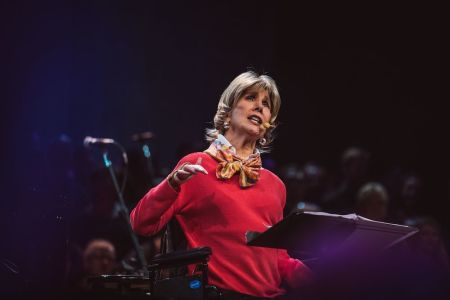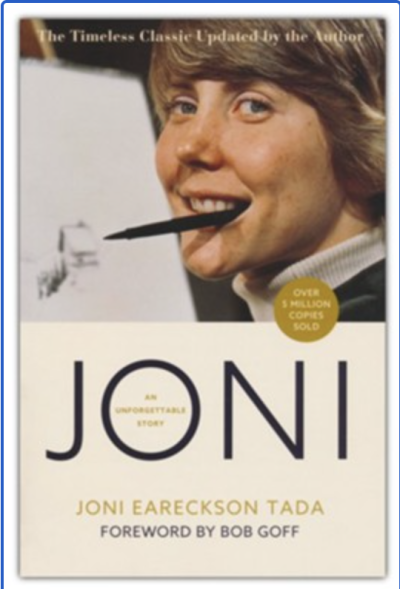Joni Eareckson Tada on remarkable ways God is using her story, finding joy amid pain

When Joni Eareckson Tada first penned her memoir, Joni, detailing how her faith sustained her after a diving accident left her paralyzed, she never imagined how her story would impact millions worldwide.
“I wrote that book when I was in my 20s, and just eight years beyond my broken neck, my diving accident (in 1967). What did I know back then? I look back and I think, ‘Why did I think I could write a book?’” Tada told The Christian Post.
And on the 45th anniversary of her bestselling book, which has since been translated into over 30 languages and made into a feature film, the 72-year-old, who married Ken Tada in 1982, released a commemorative anniversary edition that includes updated photos and a new afterword detailing her life today.
Today, she’s a bestselling author of over 48 books, radio host, singer and founder of Joni and Friends, an organization that has been advancing disability ministry and changing the Church and communities around the world since 1979.
Reflecting on her story, the author quoted Genesis 50:20, which reads: “You intended to harm me, but God intended it for good to accomplish what is now being done, the saving of many lives.”
“People always forget that second part; that God intends the good things that might come out of our suffering, for the saving of many other lives,” she said. “I'm still overwhelmed when I think of the incredible numbers of people with disabilities, specifically, who have been strengthened by the insights I shared in that book … when I think of how God has used that story to save many lives, I'm absolutely overwhelmed.”
“And honestly, with this 45th anniversary edition, my thought is, ‘Oh God, please don't let me do anything now, this late in the game, to shame Your name. Let me finish well. Let me continue on this course. Let me not stain your good reputation. You just help me to steward well and to take care of the sphere of influence you've given me so that more people might come to know Christ through hardships, especially people who suffer, people who go through hard times.’”
In addition to living as a quadriplegic, Tada has battled cancer twice and recently, COVID-19. But despite her ongoing health issues, the author has continued to share her story of faith amid suffering.
Resting in God’s sovereignty come what may, Tada said, is what enables her to have “profound, unshakable gladness” in the face of “horrible hardships and jaw-biting pain.”
For her, God’s sovereignty “isn't some doctrinal, otherworldly, theological ivory tower concept that academics talk about, but you'd never really know how to put into practice,” but a “trust in His Word; He can be trusted because He's not going anywhere.”
“I couldn't say that if that pain were happening perchance, or if it were some fluke, or if it was a cosmic roll of the dice. How can I be so confident, to speak calmly into my suffering, the confidence in God's Word were it not for His sovereignty?” she said.
“When I'm in pain, which is often, especially at night in bed when I can't sleep … I talk to my pain and I say, ‘You're not going to make me anxious, pain. You're not going to make me fearful. I'm going to walk into you. I'm going to breathe, calmly, serenely. I'm going to enter you, pain. as though I were Shadrach, Meshach and Abednego entering the fiery furnace, and I'm going to find Jesus, the Son of God, walking in the middle of the fire with me.’”
Scripture is clear that the Christian life is supposed to be hard, Tada said, citing 2nd Corinthians 6:10: “We are to be sorrowful, yet always rejoicing; poor, yet making many rich; having nothing, and yet possessing everything.”
“It seems to me, only in the Christian experience can we know both joy and sorrow at the same time, it's like it's on a continuum, and they happen simultaneously,” she reflected.
“In the West, even we Christians, we don't know what to do with suffering and pain. We try to drug it, medicate it, escape it, divorce it. If it's a child with a disability, we institutionalize it. We do everything but learn how to live with it. And I don't mean live with it begrudgingly, but live with it confident that a sovereign God has you in the midst of this for a good reason. And usually, most of those reasons are that we might cast ourselves wholly and completely on Christ Jesus.”

Through Joni and Friends, Tada seeks to tangibly carry out Jesus’ command to serve the “least of these.” COVID-19, she said, has disproportionally impacted those with special needs and disabilities, particularly those living overseas.
“We realized that they don't need wheelchairs — which of course we deliver — they need food, they need access to medical care,” she said.
To meet the physical and spiritual needs of those with disabilities at a time when many resources and support have been shut down, Tada launched Joni’s House, an international disability center located in some of the poorest areas to serve families living with a disability.
The ministry collaborates with local churches, communities and government partners to provide medical and mobility support, patient advocacy, essential resources and spiritual care to entire families living with a disability. So far, the organization has built facilities in the hard-hit countries of El Salvador, Nepal and Uganda. Tada said the organization hopes to have a Joni’s House in Ukraine “if the situation politically stabilizes there,” and in five more countries in 2023.
“It would not have happened without COVID. God showed us people are starving with disabilities, there's no access to medical care,” Tada said. “It's hard in the United States if you had a disability during COVID, but it's really hard living overseas. So I'm grateful that COVID gave us that chance to develop that."
Still, Tada challenged the Church in the U.S. to rally around those with disabilities: “There's somebody with a special needs, loved one in their family, just find out a way to help out. Just look up and down your street. If 50% of America's population struggles with some sort of disability, somewhere in your ZIP code there's somebody who is really, really hurting,” she said.
“The Church is a place where people with disabilities are not only invited in, they are embraced, and if they don't show up next Sunday morning, they'll be missed,” Tada added.
“We've got the message that can change people's hearts. It's the Gospel of love. It's looking at Jesus on every page of Matthew, Mark, Luke and John; He's hanging out with somebody with a handicapping condition. Let's follow Him; He's setting a high bar. Let's treat these people as He treats them … a heart change is required in the Church when it comes to embracing families with special needs. And I think we're on our way, I really do, in America. I think we're getting there.”
Tada acknowledged that embracing those with special needs can be “messy,” but asked: “Wasn't the cross of Jesus Christ messy? Wasn't it ugly? Wasn't it offensive?”
“The Church is going to experience those reactions,” she said. “But that's where love comes into play, when God's heart is applied to those whose needs are so desperate, like those with mental illness and those with severe depression.”
Over five decades after the accident that changed her life, Tada is still in awe at how God has used her story to change lives. Despite living with chronic pain, she’s determined to continue to use her gifts to leave a meaningful, God-glorifying impact on society.
“You're looking at a miracle,” she said. “I've been in this wheelchair for more than half a century; 55 years paralyzed without use of my hands or legs, and I cannot get over how healthy I am. I'm in pain; make no mistake, it’s hard. … Many of my good quadriplegic friends are struggling, which of course, when I hear their struggles and speak with them and pray with them, they're bedridden, many of them, I just double down my efforts to make a difference, not only in their lives, but in the lives of the people we serve at the ministry. If I'm blessed, I got to pass on the blessing. I cannot hoard it.”
“I'm privileged in a way; I have extraordinarily good health,” Tada added. “But that just re-energizes me to squeeze every ounce of ministry effort that I possibly can out of this quadriplegic body to make life better for the world's disability populations.”
Leah M. Klett is a reporter for The Christian Post. She can be reached at: [email protected]






















